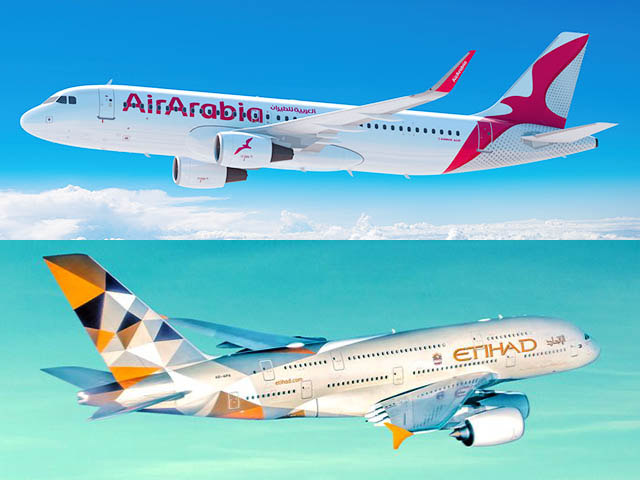Etihad and Air Arabia Alliance – Four Possible Reasons

Earlier this week, Etihad and Air Arabia made a surprise announcement. The airlines formed an alliance to launch a new LCC to operate from Abu Dhabi. This would be the first LCC to operate from Abu Dhabi and the fifth airline in UAE (after Emirates, Etihad, flydubai and AirArabia).
As of now, it is claimed that there will be no changes to Etihad’s existing operations. Similarly, no changes are planned for Air Arabia’s operations out of Sharjah.
However, it is hard to envisage a scenario where five airlines can co-exist in UAE, especially in the medium-term. So why did the Etihad and Air Arabia form an alliance? These are the possible reasons I can think of.
1. Air Arabia Looking to Expand
Despite the struggles faced by some airlines in Middle East, Air Arabia has been quietly running a stable business. In the first half of 2019, the airline posted a profit of AED 338 million. The airline has managed to launch some long-range routes out of Sharjah recently. These include flights to Kuala Lampur and Vienna.
However, it appears that Air Arabia may be constrained for capacity at Sharjah Airport. Currently, SHJ serves approximately a million passengers a month. There is a planned expansion to 20 million passengers annually but this will come up only in 2025.
On the other hand, Abu Dhabi airport has been testing its new terminal since April 2019. This is expected to be operational next year and will increase the total capacity at AUH to 20 million passengers. As Bryan Thomson, CEO of Abu Dhabi Airports, had noted in April:
“When MTB [midfield terminal building] opens we will have excess capacity which will allow us to attract demand and grow the UAE’s aviation sector more broadly and very rapidly,”
Perhaps, with SHJ lacking capacity and AUH having excess of it, Air Arabia’s future expansion may happen at the latter airport. This is the most obvious rationale.
2. Gauntlet Thrown to LCCs from India and Europe
Please refer to my earlier article – Emirates and the India problem. Since Jet Airways stopped operations, India-based LCCs have aggressively expanded to take over its routes. Airlines like Indigo, SpiceJet and GoAir now fly to UAE airports a lot more than a year ago.
Then there are Europe-based LCCs – Wizz Air and Pegasus in particular. In fact, there are some reports that Wizz Air may shift to DXB airport instead of DWC that it currently operates from.
In other words, LCC market in UAE is heating up. Therefore, this move by Etihad and Air Arabia is likely to act as a challenge / deterrent.
3. Is Etihad Abandoning LCC Strategy on Its Own Fleet?
Not too long ago, Etihad had launched its revamped ‘Economy’ service and had also proposed to unbundle fares. One of the plans was to do away with media screens on its narrow-body fleet and also to charge for some food items (although a standard meal would still be available for free).
As any traveler would understand, these steps made the narrow-body service by Etihad closer to how LCCs operate. Will Etihad abandon this strategy and focus only on its full-service and wide-body operations? Is it possible that Air Arabia would takeover Etihad’s narrow-body fleet?
These are pertinent questions. We know Etihad has been making large losses and is taking steps to turnaround its operations. Also, I cannot think of many examples in other geographies where an airline has successfully operated both LCC and FSC businesses together.
4. Is this Precursor to an Emirates / Etihad Alliance or Merger?
In my opinion, this can happen only if the previous point holds.
Despite a lot of interests in the blogging community and Bloomberg, so far both Emirates and Etihad have categorically denied merger talks. This is true both for Etihad management as well as that of Emirates.
If we were to assume that Etihad would transfer its narrow-body operations to Air Arabia, where does it leave the former? Unless Etihad and Air Arabia clearly allot geographies, I would expect a lot of cannibalization particularly while flying in and out of Abu Dhabi.
Of course, Etihad would continue to operate trans-continental flights with Abu Dhabi as a hub. However, the size of its operations would become significantly smaller than Emirates. So much so, that it may not make sense to operate the airline independently.

